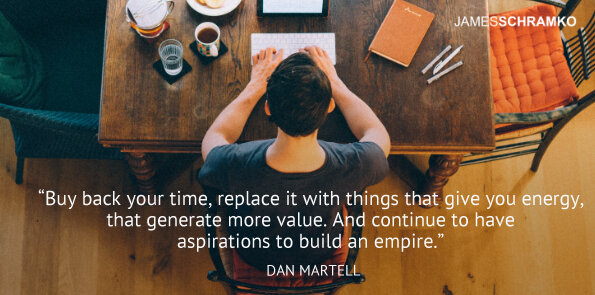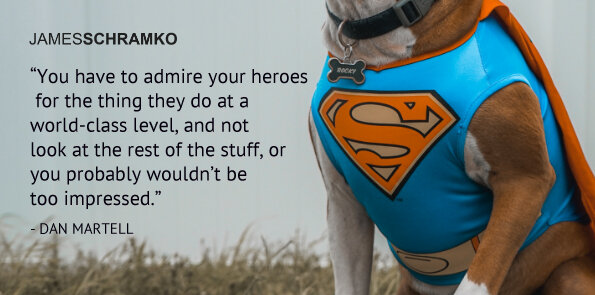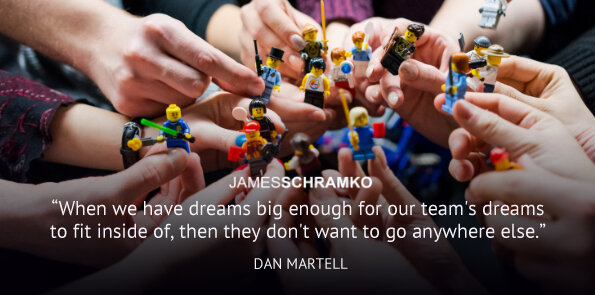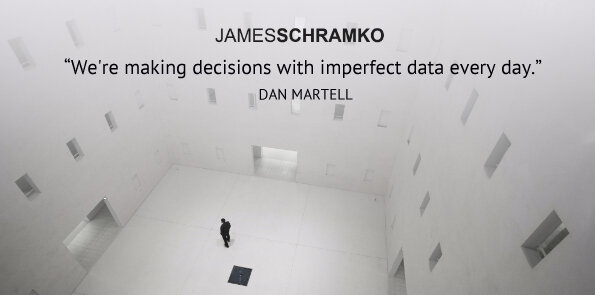Podcast: Download (Duration: 49:39 — 46.2MB)
Get Notified Of Future Episodes Apple Podcasts | Spotify | Amazon Music | Android | Blubrry | Gaana | TuneIn | Deezer | Anghami | RSS | More
James and entrepreneur/author/coach Dan Martell see eye-to-eye on the hustle and grind lifestyle – there is something better. And part of that is paying other people for their time, so you can free up yours.
In this podcast episode, they talk about Dan’s book, Buy Back Your Time.
They discuss how the right people on your team can pay dividends in the way of time freedom and quality of living.
And they touch on a lifestyle you’d think only royals have, but which is not so remote a possibility for other people.
Table of contents
1. Because hustle and grind isn’t the only way
2. What does your empire look like?
3. It’s not about not working
4. Why your PA gets to stay
5. A team you could work with forever
6. When your work situation is less than ideal…
7. Not just cogs in a machine
8. Dealing with the visionary nutjobs
9. The smart way to handle problems
10. Work with people before working with them
11. Who does Dan’s book apply to?
12. When the stuff at home affects your business
13. What having assistants does for Dan
14. Can you, too, live like that?
Because hustle and grind isn’t the only way
James enjoys that Dan has written such a book, Buy Back Your Time. It has much in common with James’s own title, Work Less, Make More, both proposing an attractive alternative to workaholism.
It certainly looks like Dan is living the dream – great income, a lovely family, passion sports, not working too hard. People probably wonder how it’s possible.
Dan loves James’s approach, which Tim Ferriss also speaks of in the 4-Hour Workweek – relative income, your income divided by the effective hours you work.
Dan’s philosophy differs a bit. The subtitle for his book is, Get Unstuck, Reclaim Your Freedom, and Build Your Empire, the reason being Dan is someone who loves creating – unchecked, he could easily do a hundred-hour week.
This came to a head when he was 28, and his then fiancee walked out on him just seven weeks before their wedding, never to return. That was his wake-up call.
What does your empire look like?
Dan has reformed, but still wants to create at the highest level possible, so is always looking for leverage.
One of his mentors is Naval Ravikant who created AngelList, and talks about four ways to get leverage. Alex Hormozi actually redesigned them to four C’s: code, content, capital and collaboration.
So Dan’s current philosophy is: buy back your time, replace it with things that give you energy, that generate more value. And continue to have aspirations to build an empire.
It’s about optimizing the primary business you’re in, getting to where it’s got great executive leadership teams, and then thinking about, what could your empire look like?
Entrepreneurs can’t help but create. The core idea behind Buy Back Your Time is figuring out how to do that with more leverage.
And everyone’s empire can be different – James’s empire, for instance, is sort of a hidden thing. The tip of the iceberg is his personal brand coaching, but his real wealth comes from being a revenue share partner in other people’s businesses, the earnings of which he transfers into investments that grow.
The essence, says Dan, is three money trades – time for money, money for time, and then money for money. The empire part is, where can I invest capital to generate more capital?
It’s not about not working
Now, Dan doesn’t think people actually want to not work. And he himself works quite a bit, relative to most people – not more than 40 hours a week, but very diligently.
Even on vacation, Dan may put in 90 minutes just before his kids wake up. But the hundred-hour workweek is a thing of the past – he has dinner every night with his family, travel, couple’s retreats.
Dan has achieved balance, with discipline, structure, and a high ability to create momentum and high creative output.
James can relate. He allots three days a week for calls, and four days off. He spends a lot of time with his daughter, swimming, painting, playing games, doing trampoline.
James doesn’t know how much family time Elon Musk has, but it’s probably not like his and Dan’s.
You have to admire your heroes for the thing they do at a world-class level, says Dan, and not look at the rest of the stuff, or you probably wouldn’t be too impressed.
Why your PA gets to stay
James likes the story in Dan’s book about a guy who was selling his business, and was sad to let his personal assistant go with it. Dan gave some advice that James would love him to share.
That was a client of Dan’s, Jonathan, who exited his business for $100 million. He’d worked with his executive admin for almost a decade, and was loath to see her go.
Dan had a mentor who’d had his own assistant, Barbara, for 23 years. This mentor credited her with knowing everything, allowing him to accomplish all he did.
He told Dan, if Dan should ever find someone like Barbara, he should tell them he wanted to work with them for the rest of his life.
That’s the advice Dan gave Jonathan. It lit him up – just barely after selling his company, he was looking forward to other projects, knowing the momentum he could bring to them.
A team you could work with forever
James relates strongly. It’s how he feels about his own team. He’s said to them, whatever business he might have, even if he should sell, they were staying with him.
Even if James had no business, he’d want to work with his team. It’s a hand-in-glove relationship, what he calls the Ironman model.
James does what only he can do – the podcast, the coaching and mentoring – and his team do everything else. Very well.
Dan had a CTO, Scott, who after Dan exited his company Flowtown, he paid out of his own pocket to do personal projects with him.
Another philosophy of Dan’s is, we build the people and the people build the business. When we have dreams big enough for our team’s dreams to fit inside of, then they don’t want to go anywhere else, because you’re creating this growth opportunity.
And it’s good for the business – continuity is a competitive advantage. And having high retention with a team lets you move so much faster, because there’s organizational knowledge that isn’t lost in a high-transaction, high-turnover culture.
It’s straight up love, says James. He’s had his team between 10 and 12 years, and the campfire momentum, the knowing of the business inside and out, is irreplaceable.
When your work situation is less than ideal…
James knows well the importance of a good work culture, having experienced the opposite as a general sales manager for Mercedes-Benz.
Everyone in the dealership liked James and hated their tyrant boss, who one day in a drunken rage threatened James with a steak knife, telling him to work elsewhere.
James very nearly left the brand, but Mercedes-Benz head office decided he was too valuable, and gave him a post to resuscitate another dealership. He spent four years there as general manager, his last job ever.
Having been through that, James makes every effort to provide a work environment his team can thrive in.
Not just cogs in a machine
It’s beautiful, says Dan. And he loves how James, unlike some, knows his team members are people, not just cogs in a machine.
Dan calls it hearts, not hands. He could pay anyone to do a task, but if he can have their hearts, have them thinking about his and his customers’ problems even outside work hours, that’s invaluable.
Dealing with the visionary nutjobs
What Dan finds funny is the number of coaching jobs he’s done where the CEO is just crazy. James has probably met these people.
He has. High visionary, creative. Nutjobs. Maniacs.
And aggressive, says Dan. He has done 360 interviews with executive teams whose CEOs routinely get on calls to berate them.
They’ve studied bad role models, says James – Henry Ford, Steve Jobs, Bill Gates – they think that’s how it’s done.
One of James’s partnerships aims to fix such situations. At VirtualDOO, they educate and help visionaries to achieve what they want by interfacing between them and the rest of their business.
Dan has a philosophy behind this, backed by research, that most entrepreneurs have been through chaos as children. They’re used to uncertainty, and so entrepreneurship makes sense to them.
Being risk takers and visionaries, unfortunately, makes them tough leaders. That’s why Dan has a chapter in his book on leadership and specific strategies to help CEOs create a culture of feedback and candidness.
The smart way to handle problems
A method Dan thinks most people resonate with is the 1-3-1 Rule, something he learned from a friend, Brad. It’s basically trying not to be the person with all the answers
When someone you’ve hired comes to you with a problem, ask them: What is the ONE problem you’re seeking feedback on? What are the THREE viable options you’ve evaluated? And what’s your ONE recommendation?
If someone hasn’t done the work to find three viable options, they go off and do it, then come back. And 90 percent of the time, the one recommendation they make fits the bill.
After three or four times going through this, people eventually start to self-solve their problems. This is where a culture of empowerment and ownership can grow.
Work with people before working with them
James wants to talk about Chapter 10, where Dan talks about the test first hiring method. James likes that, and actually encourages it in his and his wife’s recruitment business.
Dan once had an audience with Seth Godin, who said on the topic of hiring, I just have a simple rule with people – I can’t work with you unless I work with you.
Asked to explain, he said, I always simulate the work before we actually end up working together.
It was obvious in hindsight, says Dan. Now they have three different recruitment filters – video submission to test a number of different things, a profile assessment for another data set for various aspects, and the test project.
They identify three final candidates and create a test project the three of them have to do, the same project for all three, so they can compare. And they deliberately don’t provide all the information, because that’s the essence of working in business – we’re making decisions with imperfect data every day.
It’s usually a 10-hour paid project. And because it’s the same for everyone, they see the default approach as well as get a good sense of people’s creativity and problem-solving ability.
James loves that. His recruitment agency has a client who only does tests, doesn’t bother with interviews, because the tests tell them enough.
James himself feels with some partnerships he didn’t test enough before getting involved, while with others he’s done enough previous work with them to know he wants to go deeper.
Who does Dan’s book apply to?
For people who don’t know Dan, the prime business model he deals with is SaaS, helping founders to develop software. Is there anything in his book specific to that industry, or would everything in Buy Back Your Time apply to any business owner?
Dan considers himself a pure entrepreneur, whose friends are all entrepreneurs, not SaaS for the most part. So he’s been advising people on the philosophy for around 15 years.
And Dan’s SaaS Academy deals 80 percent in business best practices. Twenty percent, though, is very specific – there are nuances that apply specifically to software, because the cost of a wrong decision is high.
Buy Back Your Time, however, is for the specific customer doing 1.3 million, with 12 to 13 employees, an agency owner that has tried to scale and keeps hitting against what Dan calls the pain line. That pain line is because of the way you’re leading and the way you’re buying back your time; you’re adding capacity, not buying time out of your calendar.
Instead of focusing on your calendar and optimizing for things that light you up, that actually make you a lot of money, you’re just trying to add capacity to do more work, and you end up burning yourself out. So the book is really trying to help people.
Dan wants to help entrepreneurs execute opportunities that could help them 10x their business overnight, without feeling the pain of those decisions, because they’ve laid the proper foundation.
When the stuff at home affects your business
It’s good, says James. And he’s noticed they have a similar approach – taking inventory of where people spend their time, scoring the activities, finding the ones that make the most impact, directing their attention to that.
And Dan mentions that for a lot of people, the thing that pulls on their time is at their home, outside of work. James believes that, and spends a good amount of time helping people manage themselves around themselves.
What having assistants does for Dan
Business for Dan has never been about money, he says. He just likes to build stuff.
The question is how he can do that and still be an epic husband, father, all that. So one very unique thing he has is a dedicated house manager.
Betty doesn’t live in the same house as Dan, but she shows up at 10, reports to his wife, and is CEO of all their personal matters – everything from insurance on all their assets to maintenance, scheduling, coordinating, kids’ stuff, family stuff.
Dan has an executive assistant, who’s CEO of his professional life, involved in all his companies and rote matters and schedules and meetings, emails, calendar. Every week she joins a meeting with Dan’s wife and Betty to review what Dan says is crazy stuff.
At four o’clock, for instance, Dan gets a shake brought to his office, because if he doesn’t get protein in the afternoon, it messes with his mood.
It’s a question of how Dan can move as fast as he can, and be as effective as he can, and have other people support him at different interaction steps. He hasn’t put gas in his car in years, or been to a grocery store.
And he doesn’t share it to brag, but to inspire. Things like having Betty fly ahead to an Airbnb to prep things so when they arrive meals are ready, they can eat healthy, they can maintain routines and still enjoy people they’re going to see – it really allows them to get more out of life.
It’s a super advanced level, says James. Some people could start by getting meals prepared, their lawns mowed or their car washed.
Dan is living like a royal in a way. But he doesn’t feel any awkward class distinction with his assistants – they’re incredibly well-paid for what they do, both the work and the discretion they practice, keeping stuff out of socials and not even mentioning they work for Dan.
Can you, too, live like that?
James thinks it’s by far the most interesting thing they’ve talked about. It’s actually the last chapter in Dan’s book, which he put in just to tease.
James recalls when he traveled as a speaker. His assistant, Kerry, would help organize his tickets, take slides to the presenters, deal with conference organizers – she once even found him an extra speaking spot, by which he made an extra 100,000 pounds in sales.
He thinks a life like Dan’s is incomprehensible to most people. But to know it’s possible, and to decide if you want it, he believes, is the big takeaway.
Dan’s websites are buybackyourtime.com and danmartell.com.
Dan is a software god, James wants to remind. if you’ve got software and you’re not sure how to make it work, he can grow your business.
And check out his book, Buy Back Your Time – it’s a good read if you’re interested in having an amazing life.
Enjoyed the show? Leave us a review on iTunes













Leave a Reply